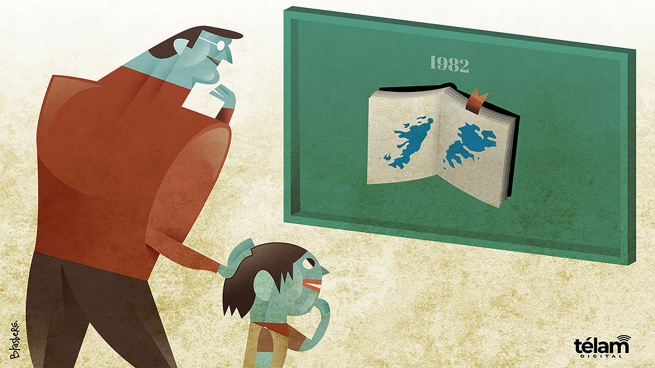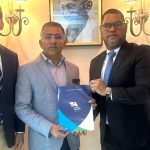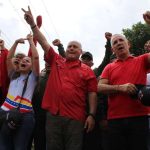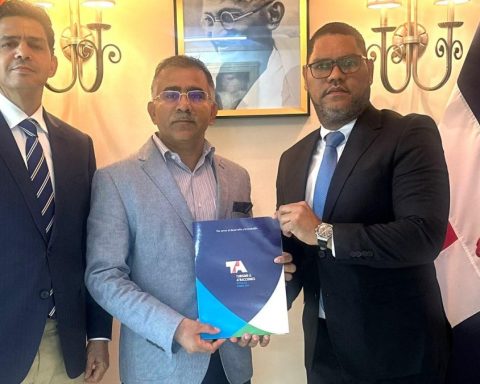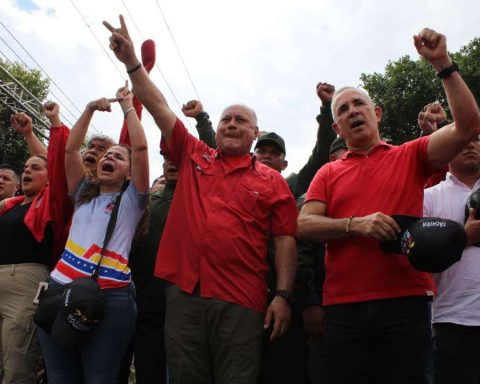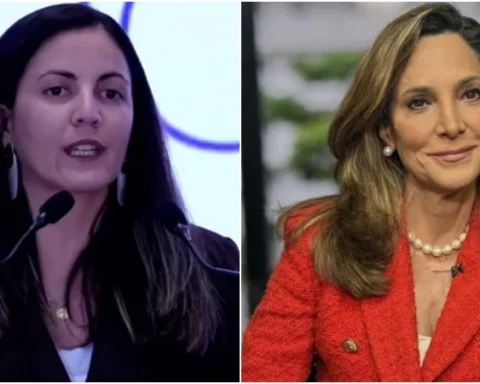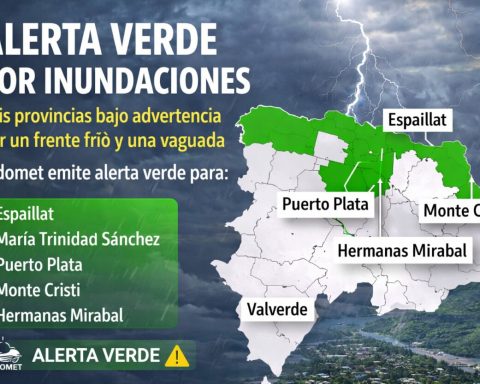40 years after the Malvinas war, primary and secondary teachers highlighted the role of the school in the construction of the memory of the country’s recent past, within the framework of a quest to “recover the debate over the islands” after “many years of silence”.
“I think it is a teacher’s duty to keep the memory alive and that the children can also build what happened in Malvinas at school,” Valeria Ayala (46), a lawyer and teacher in public secondary schools in the Berazategui party in Buenos Aires, told Télam.
Talks with ex-combatants, visits to museums, projection of film records and reading of historical texts are some of the pedagogical proposals used by teachers to address the Falklands War at different school levels.
“I think it is a teacher’s duty to keep the memory alive and that the children can also build what happened in the Malvinas at school”Valeria Ayala
“For the boys it is very moving to access testimonies from that time, they always have a lot of concerns and questions to ask,” said the teacher, who assured that even today it moves her to remember the letters she wrote to Argentine soldiers when she was a student. first grade and war broke out.
“I always see that the most noise left for boys is to think how could Argentina get to a war against a power, how did it end in such an unequal confrontation“, pointed out the teacher. And she added: “It is not an easy task to be able to give an answer to that”.
Matías Valcarce (46), a history teacher in secondary schools in Berazategui, assured that it is still “a small group of teachers” who are “most committed to working on the country’s historical memory.”
“For a long time it was very difficult to work on the Malvinas issue, due to the long process of demalvinization that we are experiencing, which affected all orders of society,” Valcarce recalled.

However, he assured that in recent years there has been “a kind of ‘remalvinization'” (sic) from which a greater amount of teaching material, courses and training for teaching staff is increasingly available.
“It is essential that the war not only be talked about on the anniversary, as a memory, but rather discuss and think about how it affects us today and what would be the way for Argentina to recover the sovereignty of the islands,” he added.
Both teachers agreed that, contrary to what is usually believed, “there is a very strong interest in the boys to work on this subject”.
“It is not true that young people are not interested in anything, on the contrary, they are greatly challenged by issues related to violence in these dimensions. They find it shocking and sometimes find it hard to believe that what they study is this same countryValcarce said.
Proposals to address Malvinas in the classroom
In this sense, he highlighted the experience of the Youth and Memory program of the Provincial Commission for Memory (CPM), in which both teachers have been participating for some years now with different courses.
“The CPM has a fundamental role both in dealing with the military dictatorship and what Malvinas was and the kids get hooked a lot, they even end up making productions independently, outside of school,” explained the teacher.
A total of 185,000 students have already participated in this program, which has been in operation for 20 years, making up 12,000 research teams, with around 21,000 teachers involved, according to CPM data.
For her part, Mariana Tevez (40), a secondary school history teacher, also highlighted the program Malvinas in Schoolsfrom which the students receive the visit of a group of ex-war combatants in the schools.
“It is not true that young people are not interested in anything, on the contrary, they are greatly challenged by issues related to violence in these dimensions. They find it shocking and sometimes they find it hard to believe that what they study is this same country”Matias Valcarce
“This has always been very educational for me because the boys are committed in a unique way due to the impact generated by the experiences of war veterans. Their stories have a very important educational role,” said Tevez.
Regarding the approach to the Malvinas issue in her subject, the teacher highlighted: “It is not simply talking about the past, it has to do with the exercise of memory, of remembering so that it does not happen again and to understand how harmful the wars, especially for underdeveloped countries like ours, that we don’t have the military power to face it”.
With different degrees of analytical depth, the Malvinas war is addressed in both primary and secondary.
“When one mentions the Malvinas war with children of this age, inevitably a question arises that is difficult to address: Why? That is precisely the most complex question,” said Agustina Cardoso, a primary school teacher.

In dialogue with Télam, he explained that the complexity of the subject “is taking place year after year” as children “internalize historical processes beyond ephemerides”, starting in the youngest grades with children’s stories and other adapted resources that address what happened.
For the last grades of primary school, when children have “an already more developed level of abstraction”, they begin to “break down, according to age, the political and economic reasons that drive a war through various pedagogical proposals”, as the testimonial account.
“Starting from the sensitive story and in the first person helps to ‘humanize’ the facts. They are not just dates and data in a textbook, but they are intervening lives in the national past”,
Four decades after the Falklands War, the teachers agreed that teaching this “so painful” topic in schools for the memory of the country is “a debt to those who defended the islands” and “an obligation” so that the new generations do not forget.
“Malvinas must be taught so that what we fight for is never forgotten”
On the eve of a new anniversary of the start of the Malvinas war, Víctor Veneziano, a former combatant and auxiliary staff in a school in the suburbs of Buenos Aires, highlighted the importance of teaching and talking about the Malvinas in schools so that “they never forget what we fight for.”
“The new generations have to study and know what happened, they have to always carry it in their hearts. Malvinas is something that can never be forgotten,” Veneziano, 60, who has been working as an assistant in the Primary School No. 46 of the Buenos Aires district of La Matanza.
Every year, when this date arrives, the teachers of that institution come to him in search of a “sensitive story” that they later contextualize historically together with the students of the different grades.
“The spontaneous reactions (of the boys) denote surprise when listening to a living testimony. Víctor becomes big in their eyes, after every April 2 they no longer look at him the same way,” said Agustina Cardoso, a history teacher at that institution.
In March 1982, Veneziano was awaiting discharge from military service when he was notified to go to Malvinas: “They didn’t sign my notebook and they took us, in mid-March, directly to Malvinas. We put together the bag and in one day another we fell into a war, having no idea what we were doing,” he said.
“I keep telling this because you can never send the boys to a slaughterhouse like they sent us, but for that they have to know what happened,” said the ex-combatant who worked as an ammunition supplier three kilometers from Puerto Argentino.
“We went without the corresponding clothing or equipment, the weapons we had were not good. The conditions we were in were terrible, the frozen water was up to our waist in the foxhole and we were starving,” he recalled.
On the other hand, the English attack was “infernal”: “They attacked us from all sides, from ships, planes and people in hand-to-hand combat. They were very powerful and also had the support of other countries, we must not forget that” .
“Sometimes I am still afraid to tell what I experienced, because I am just one of those tortured and staked,” the former combatant, who is part of the more than a hundred former soldiers who denounced the torture and human rights violations perpetrated, told Télam by the Argentine Army during the war and who still demand that the Supreme Court of Justice consider it crimes against humanity.
“We were so hungry that I went to a shed where there were chocolates and out of desperation I grabbed them and gave them to my companions,” Veneziano said. “When they discovered it, my first lieutenant and the non-commissioned officers staked me, tied my hands with wires and the feet with ropes and they nailed me to the ground, which was frozen. They would have left me there for 10 hours”.
“Because of this situation I returned with the beginning of frostbite. After two or three years I was able to walk again and be better, but that was the consequence of what they did to me, not those from there, ours,” he added.
“I spent 74 days in the Malvinas and before we left, I don’t remember very well, but they made us sign the pact of silence and we couldn’t talk about the war until approximately 25 years later,” recalled Veneziano.
After so many years of silence, the ex-combatant urged “to teach Malvinas in schools and talk about what happened with the boys, so that they never forget what we fought for.”
